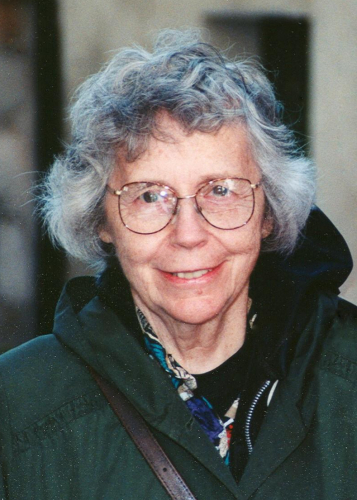Radical Idealism and Extreme Practicality Came Together in the Life of Lois Booth
This article was first published on November 8, 2019 in the Concord Monitor.

Reflecting on the life of her mother, Barbara Berwick says, “It seemed she would consider first what she thought was right. Then she would think about how reality might arrange itself around what was right.”
It was that spirit that made Barbara’s mom, Lois Booth, at once the most idealistic and the most practical person I’ve ever known.
Her study of the horrors of the first world war turned Lois into a pacifist by her high school days. With her husband Don, Lois joined a sprawling community of conscientious objectors and social reformers who tried to organize their lives around creation of a world free from war and violence. It was a vision they took seriously and applied to daily life as well as political causes from the 1940s to the twenty-first century.
For Lois, much of her idealism was applied to the matter of raising a family. As she put it in a letter, written around 1960, “We continue to be fully occupied with the basic problems of making a living and caring for our children.” (She had six) That meant attention to food, cooking, education, and complementing Don’s home construction business by becoming a realtor.
Years before the Woodstock generation was “going back to the land,” Lois was studying the methods of organic food production. “She read everything she could about it, and she had legendary success. At the height she had at least a couple acres of amazing gardens, and all sorts of natural tricks to grow beautiful vegetables and fruits,” says Barbara.
It wasn’t just food production that put Lois ahead of her times, Barbara recalls. “I always felt she sort of ‘invented’ things that now are commonplace,” things like health foods, natural childbirth, and recycling.” Don later became the Concord area’s premiere builder of passive solar houses, pioneering designs to minimize the use of fossil fuels and nuclear-derived electricity.
But Lois always felt the tension between attention to family and attention to the world. “I often question whether it is right to spend so much time and energy on our personal problems with the world almost on fire around us,” she wrote in the early 1960s.
Although she was part of a Women for Peace group in Concord that protested atmospheric testing of nuclear weapons, led a study group on Vietnam in 1965, and leafletted high school students about the draft in 1968, Lois’ career as a peace activist didn’t take off until her kids were grown and gone from her Canterbury home. But even there, her focus was as practical as it was visionary.
In 1975, Lois was one of several New Hampshire Quakers who turned their attention to establishment of a local branch of the American Friends Service Committee, which at the time had staffed offices in the other five New England states but no such presence in New Hampshire. When Marge Swann, the AFSC’s regional director, suggested that local fundraising would help make it possible, Lois turned her attention to that most practical and under-appreciated of volunteer activities.
Devoted to public education, it was Lois who started up a local AFSC newsletter, Quaker Witness. If people only knew the dangers posed by nuclear weapons, she believed, surely they would want to take action to control and eliminate them. When others, including her husband Don after he retired from building solar houses, spent hours on the street holding signs and banners, Lois was more likely to be found at a desk producing leaflets, writing newsletters, and organizing conferences, without neglecting the importance of those fundraising appeals.
Not only was Lois central to the birth of the New Hampshire AFSC office, she played an equally important role in the birth of the organization now known as NH Peace Action, which grew out of the “Nuclear Freeze” movement of the early 1980s. As the anchor of the Peace Action board and a nearly full-time volunteer in its Concord office, Lois helped keep the peace movement on course through several presidential administrations, a number of military misadventures, and a succession of young staff members.
While she also served on Peace Action’s national board and regional AFSC committees, Lois never lost her focus on educating and organizing Canterbury neighbors. Neither did she fail to give attention to individuals who needed a warm place to stay, needed a good meal, and needed her love.
Lois Booth, who died on September 13 at the age of 97, opened her home and her heart to those who yearned for peace. She believed that if something was right, it must be possible. In a world that’s still on fire, her spirit lives on.
For more about Lois Booth, go to http://www.loisbooth.wordpress.com.
